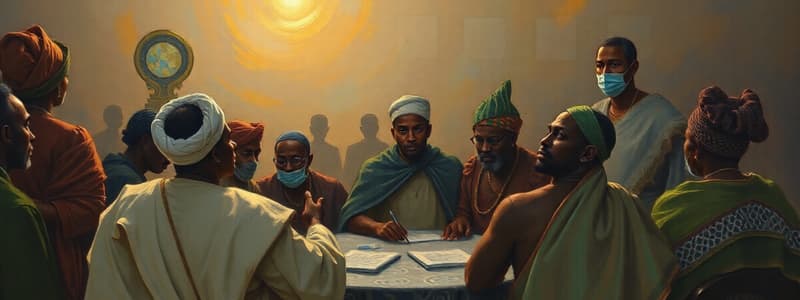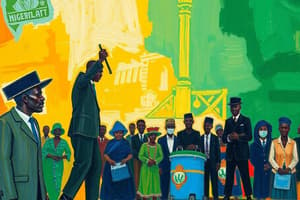Podcast
Questions and Answers
What is the term used to describe Nigeria's government structure that divides power between the national and state governments?
What is the term used to describe Nigeria's government structure that divides power between the national and state governments?
- Confederation
- Unitary System
- Decentralization
- Federalism (correct)
What is a requirement for a candidate to win the presidential election in Nigeria?
What is a requirement for a candidate to win the presidential election in Nigeria?
- Secure the most votes without a runoff
- Receive at least 40% of the vote
- Win a majority of the national vote
- Obtain 50% of the vote (correct)
Which law system is employed in Nigeria, alongside aspects of traditional governance?
Which law system is employed in Nigeria, alongside aspects of traditional governance?
- Customary Law System
- Religious Law System
- Civil Law System
- Common Law System (correct)
What is the term for Nigeria's economic situation where much of its revenue comes from the oil industry?
What is the term for Nigeria's economic situation where much of its revenue comes from the oil industry?
What is the purpose of the Federal Character Principle in Nigeria?
What is the purpose of the Federal Character Principle in Nigeria?
Which group is known for protesting in the Niger Delta region of Nigeria?
Which group is known for protesting in the Niger Delta region of Nigeria?
Which of the following serves as the chief lawmaker in Nigeria?
Which of the following serves as the chief lawmaker in Nigeria?
What characterizes the patron-clientelism found in Nigeria's political system?
What characterizes the patron-clientelism found in Nigeria's political system?
Flashcards
Federalism
Federalism
A political system with a division of powers between a national government and regional states. Nigeria's government distributes power between the federal government and its 36 states.
Presidential System
Presidential System
A political structure in which the head of state is directly chosen by the people through elections. The president acts as the top executive, responsible for leading the country and enforcing laws.
Majority Vote System
Majority Vote System
An election where a candidate needs to get a majority of votes (more than 50%) to win outright. If no candidate achieves this, a second round of voting is held between the top contenders.
Bicameral Legislature
Bicameral Legislature
Signup and view all the flashcards
Common Law System
Common Law System
Signup and view all the flashcards
Multiparty System
Multiparty System
Signup and view all the flashcards
Patron-Clientelism
Patron-Clientelism
Signup and view all the flashcards
Rentier State
Rentier State
Signup and view all the flashcards
Study Notes
Nigeria's Political System
- Nigeria transitioned from an authoritarian regime to a democratic one with a written constitution and regular elections.
- The government operates under a federal system, dividing power between the central government and state governments.
- Nigeria utilizes a presidential system.
- The president is directly elected by popular vote for a 4-year term, limited to two consecutive terms.
- A majority of the vote is required for election, with a run-off election triggering if no candidate reaches this threshold.
- Requires 25% of the national vote in 2/3 of the states in the run off.
- The president serves as head of state, head of government, chief executive, commander-in-chief, head of civil service, approves domestic legislation, and conducts foreign policy.
- The president appoints cabinet members with Senate approval.
- Impeachment is a way to remove the president from office.
- The government is bicameral, comprising the House of Representatives (lower chamber, elected by plurality) and the Senate (upper chamber, elected by plurality).
- Nigeria employs a common law system with judicial review power.
- Aspects of Sharia law are used in 12 northern states.
- The country has a multi-party system.
Nigeria's Socioeconomic Characteristics
- Patron-Clientelism (Prebendalism): Favor exchange for personal gain within the job market is common.
- Social Movements: Groups like MEND (Movement for the Emancipation of the Niger Delta) and MOSOP (ethnic minority group) address issues in the Niger Delta region.
- Ethnic and Religious Cleavages: Ethnic divisions and religious differences (predominantly Muslim in the north and Christian in the south) are significant factors.
- Regional Cleavages: Economic disparities exist, primarily due to the oil industry being concentrated in the wealthier south.
- Rentier State: Nigeria significantly relies on oil exports for revenue.
- Resource Curse: Over-reliance on oil production limits diversification and economic development.
- Bureaucracy: High levels of corruption and assumed bloat in the bureaucracy are concerns.
- State Corporatism: Para-statals, privately owned but with government appointees, give the appearance of public-private cooperation while maintaining state control.
Nigeria's Foreign Policy
- Nigeria is a significant member of several supranational organizations, including the African Union (AU), ECOWAS (Economic Community of West African States), OPEC (Organization of Petroleum Exporting Countries), and the UN (United Nations) and WTO.
- Nigeria's importance in these groups is due in part to its oil exports.
- The Federal Character Principle: A Nigerian quota system to balance ethnic representation in government appointments.
Other Points
- Boko Haram: A significant terrorist/insurgency threat.
Studying That Suits You
Use AI to generate personalized quizzes and flashcards to suit your learning preferences.




